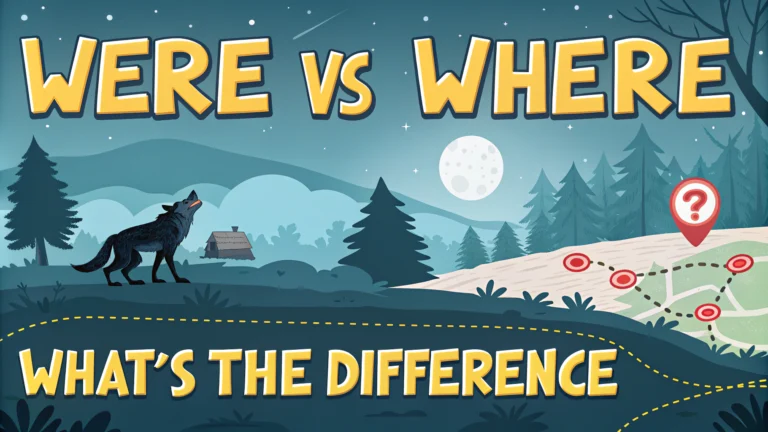Words that sound alike but have different meanings can be tricky. “Were” and “where” are prime examples of this challenge. Many writers struggle to use these words correctly, leading to confusion in their writing. This article will clarify the distinction between “were” and “where,” helping you use them with confidence.We’ll explore the definitions, usage rules, and common mistakes associated with these words. By the end, you’ll have a solid grasp of when to use “were” and when to use “where” in your sentences. Let’s dive into the world of homophones and improve your writing skills!
Defining “Were” and “Where”
“Were” is a verb, specifically the past tense plural form of “to be.” It’s used for:
- Second person singular and plural (you)
- First person plural (we)
- Third person plural (they)
“Where,” on the other hand, is an adverb or conjunction related to location. It’s used to:
- Ask about a place or position
- Refer to a place or situation
Common Usage and Examples
Let’s look at some examples to clarify when to use each word:”Were” in action:
- You were late for the meeting.
- We were excited about the trip.
- They were studying all night.
“Where” in sentences:
- Where did you put my keys?
- I don’t know where the restaurant is.
- That’s where I grew up.
Tricks for Remembering the Difference
To help distinguish between “were” and “where,” try these memory aids:1. “Were” is related to “we” – both are about people or groups.2. “Where” contains “here” – both are about places.Another tip: If you can replace the word with “are” (in present tense), use “were.” If you’re asking about location, use “where.”
Quick test:
- We ___ going to the park. (were)
- ___ are you going? (Where)
Improving Your Writing Clarity
Mastering the difference between “were” and “where” can significantly enhance your writing. Clear communication is key in both professional and personal contexts. Let’s explore practical strategies to refine your usage of these often-confused words.
Proofreading Techniques
Effective proofreading is crucial for catching “were” vs. “where” errors. Try these methods:
- Read your text aloud
- Use text-to-speech software
- Take breaks between writing and editing
- Ask a friend to review your work
These techniques help you spot mistakes you might otherwise miss.
Common Pitfalls to Avoid
Be aware of these frequent mistakes:
- Using “were” in singular situations (e.g., “He were happy” instead of “He was happy”)
- Confusing “where” with “wear” in phrases like “Where did you get that shirt?”
- Misusing “where” in time-related questions (e.g., “Where is the party?” instead of “When is the party?”)
Recognizing these errors will help you avoid them in your writing.
Practice Exercises
Improve your skills with these exercises:1. Fill-in-the-blank sentences:- The keys ___ on the table. (were)- ___ did you park the car? (Where)2. Sentence correction:- Incorrect: Where you at the meeting yesterday?- Correct: Were you at the meeting yesterday?3. Write short paragraphs using both “were” and “where” correctly.Regular practice reinforces proper usage and builds confidence.
Conclusion
Mastering the distinction between “were” and “where” is a valuable skill for clear, effective writing. By understanding their definitions, practicing regularly, and using proofreading techniques, you’ll avoid common mistakes and communicate more precisely.Remember:
- “Were” relates to past tense of “to be”
- “Where” refers to location or place
With these tips and consistent practice, you’ll confidently use “were” and “where” in your writing, enhancing your overall communication skills.
FAQs about “Were” vs. “Where”
1. What’s the difference between “were” and “where”?
“Were” is a verb, specifically a past tense form of “to be.” “Where” is an adverb that refers to a place or location.
2. How do I use “were” in a sentence?
Use “were” as the past tense of “are” for plural subjects or the second person singular. Example: “They were at the party last night.”
3. When should I use “where” in writing?
Use “where” to ask about or indicate a place or location. Example: “Where did you park the car?”
4. What are common mistakes with “were” vs. “where”?
- Using “where” instead of “were” in past tense statements
- Confusing “we’re” (contraction of “we are”) with “were”
- Misusing “where” in questions about time or manner
5. How can I remember the difference between “were” and “where”?
Associate “where” with location by remembering it contains “here.” “Were” is related to the verb “are,” so think of it as an action word.
6. Is “were” ever used in the present tense?
“Were” can be used in the present tense for hypothetical situations or wishes. Example: “If I were you, I’d accept the job offer.”
7. Can “where” be used as a conjunction?
Yes, “where” can function as a conjunction to connect clauses. Example: “This is the house where I grew up.”
8. What’s the correct usage: “If I was” or “If I were”?
In hypothetical situations, “If I were” is grammatically correct. It’s called the subjunctive mood.
9. How do you use “were” in question formation?
Use “were” in questions about the past for plural subjects or “you.” Example: “Were you at the meeting yesterday?”
10. What are some synonyms for “where”?
| Synonym | Example |
|---|---|
| In which place | In which place did you leave your keys? |
| At what location | At what location shall we meet? |
11. How do you use “where” in relative clauses?
Use “where” to introduce a relative clause that provides information about a place. Example: “The restaurant where we had dinner was excellent.”
12. What’s the difference between “wear,” “were,” and “where”?
Wear: A verb meaning to have clothing on
Were: Past tense of “are”
Where: Refers to a place or location
13. How do you use “were” with singular subjects?
Use “was” for singular subjects in the past tense, except for “you” and in the subjunctive mood. Example: “She was happy” but “You were happy.”



















